| Reviews & Columns |
|
Reviews DVD TV on DVD Blu-ray 4K UHD International DVDs In Theaters Reviews by Studio Video Games Features Collector Series DVDs Easter Egg Database Interviews DVD Talk Radio Feature Articles Columns Anime Talk DVD Savant Horror DVDs The M.O.D. Squad Art House HD Talk Silent DVD
|
DVD Talk Forum |
|
|
| Resources |
|
DVD Price Search Customer Service #'s RCE Info Links |
|
Columns
|
|
|
Well Digger's Daughter, The
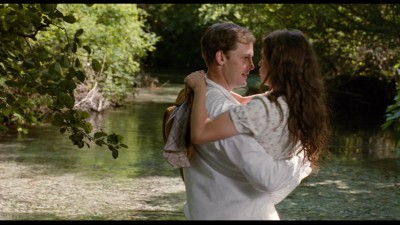
The Well-Digger's Daughter is a coming full-circle of sorts, and also in a way a continuation of a well-worn, seemingly endless loop in French cinema (and culture). Its director, adapter, and star, Daniel Auteuil (Caché, The Girl on the Bridge), is presenting us with a remake of a 1940 film of the same name by Marcel Pagnol, a mid-20th-century French playwright, novelist, and filmmaker; twenty-five years ago, Pagnol was indirectly responsible for Auteuil's rise to international art-house stardom, when Jean de Florette and Manon of the Spring (both 1986), a pair of films that were Auteuil the actor's prestige-picture introduction to his largest English-speaking audience, were adaptated by director Claude Berri from a linked pair of novels, published in the '60s, by Pagnol -- books that Pagnol had himself adapted from films that he'd written and directed in the early '50s! In short, if France can be said to have a "heritage cinema" akin to the stream of Jane Austen films and Merchant-Ivory adaptations of E.M. Forster novels that define that category in Britain, it's a legacy that is more or less Marcel Pagnol's very own cottage industry. What does the weight and constraint of so very much affectionate familiarity and history mean for a film like The Well-Digger's Daughter? It's bound by multiple layers of tradition and convention, no question; Auteuil, whether sage or timid, is playing it decidedly safe with this material, and nobody's going to accuse him of being a bold, audacious auteur realizing a personal vision and style on celluloid. But if you accept that something familiar, even very familiar, can offer its own kind of interest and enjoyment, the film meets you more than halfway; the well-earned, modest but engaged classiness of its classicism easily compensates for its strict adherence to a smooth, well-worn groove.
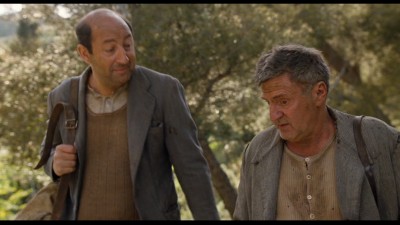
Auteuil himself plays the curmudgeonly, mindlessly old-fashioned, but (of course) gold-hearted well-digger of the title, M. Amoretti, a middle-aged widower raising a bevy of daughters and making what he's proud to consider a "real" (manual-labor) living against the golden-breadbasket backdrop of the country outside the Southeastern French town of Salon. He and his coworker/best friend, Felipe (Kad Merad, The Chorus) idly chat about how his luminously lovely, saintly second-eldest daughter, Patricia (Astrid Bergès-Frisbey, a fair, full-lipped vision of delicate feminine beauty in her country girl's floral-print dress), raised in Paris after her mother's death and returned home to her papa's embrace, is a "princess" without a prince to marry her. Patricia's marriage being inevitable at her time of life (the film is set immediately before and during World War II, and it opens on her 18th birthday), Felipe offers to take on the role of fiance in the absence of any suitable prince, and the cheerfully thickheaded Amoretti agrees. The pair of good-hearted, simple working men are as clueless about the long-running crush of the eldest daughter, Amanda (Émilie Cazenave) on Felipe as they are that Patricia has just met and fallen in exuberant, youthful love with her "prince," who has appeared to her in the form of Jacques Mazel (sexy bad-boy Nicolas Duvauchelle, familiar from many French films fine (White Material) and less so (Four Lovers)), the only son of Salon's premiere bourgeois shopkeepers (Jean-Pierre Darrousin, Le Havre, and Sabine Azéma, director Alain Resnais's spouse and recurring star of late).
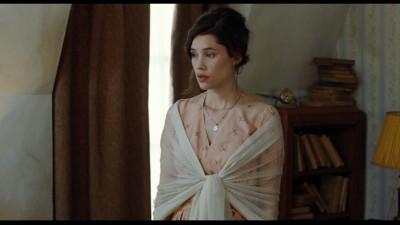
It goes without saying that the Amorettis, like the entire culture around them, are good, old-fashioned Catholics, so when Patricia and the sincere but flippant (because spoiled-affluent) Jacques give in to nature one night, and she is soon thereafter left with child just as Jacques is shipped off to the French Air Force because of the war, she earns the disgraced shame of her beloved father. The true-hearted, delicate-featured maiden feels abandoned by Jacques because his half-hysterical, overprotective mother has failed to deliver the love letter her son meant for Patricia as he hurried to leave for the front; after she's permanently banished to live a spinster aunt in a nearby town before she begins to show and brings shame down on her entire family, much of the film is taken up with her father's slow, slow, reluctant embrace of his "bastard" grandchild, as well as the Mazel's equally gradual coming around to taking up their son's paternal responsibility and nurturing in his absence, driven by the wisdom of sadness in the wake of news that Jacques has been killed. But Patricia is left bereft of any hope for true love...unless, by some miracle, the well-founded assumption that Jacques has been killed is somehow a mistaken one, which would then make the film, with its bittersweet and tangled story, a "comedy" in the classic, Shakespearian sense (split lovers and families reunited in a joyous engagement and overall reunification).
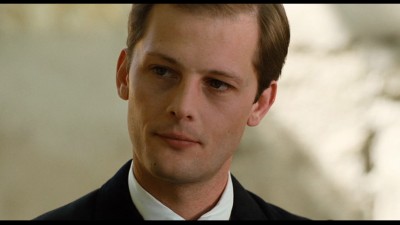
Auteuil has recruited a star-studded cast of accomplished actors to play out this sad love story, with its simple, even elementary themes (love and loyalty between family and couples, and the particular codes governing those matters in their specific time and place) and twisty plot, and these roundly accomplished and well-cast actors are its first saving grace: Auteuil is physically and temperamentally perfect to play the crusty-on-the-outside, sentimentally melting-on-the-inside Amoretti, catching his often comical gruffness, uneducated misconceptions, and self-delusion (he's the type who will casually threaten his daughters with a seldom-delivered slap, or to lose them purposefully in the woods, if they don't stay in line, but is ultimately utterly helpless, as when he's sincerely leery of letting the Mazels near his infant grandson lest they kidnap him) without letting him slide into buffoonery. Merad, Darrousin, and Azéma make their more minor characters nuanced and lively, adding diverse tones of comedy and heartbreak to the mix. Bergès-Frisbey and Duvauchelle, for their part, deliver open, engaged, but nuanced performances and are, perhaps just as importantly in this context, the eye-candy physical manifestation of beautiful young love, making just the sight of Patricia and Jacques together compelling enough reason to keep us hoping against hope for their eventual safe and secure union.
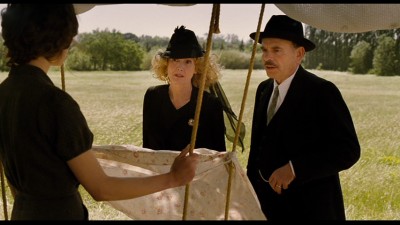
Auteuil's other strength is the modest, elegant simplicity of his filmmaking, which is never surprising, but which does please with its relaxed assurance, engagement, and taste. Within the strict pictorial and pacing genre conventions of period drama, his every choice is the right, more-restrained, less-gloopy one: His framings are plain, simple, and unadventurous, but he has an eye that, in collaboration with cinematographer Jean-François Robin (Betty Blue) and editor Joëlle Hache (The Girl on the Bridge) allows every scene and sequence to contribute to the film's overall regular but attentive classical rhythm and visual interest, evading the rote temptation to blandly coast on the aura of Pagnol's scenario and plot, while Alexandre Desplat's lush orchestral score (natch) doesn't soar too insistently and has a nice undertow of melancholy to it (though I'm sure I won't be the only one to notice that its most prominent melody bears a somewhat theme-appropriate but bizarre resemblance to the la-la-la Rosemary's Baby theme). The film's weaknesses, such as they are, are built-in, making them both unavoidable and somehow more forgivable: The film's Provençal settings can't help being as extraordinarily beautiful as they are, but the whole touristy Year in Provence thing, and Auteuil's frequently sunset-and-landscape-centric mise-en-scène, intermittently give the queasy impression of sopping to fuzzyheaded ideas about a more "simple, natural" (never mind harshly repressive) past, or romanticizing, sappy-minded outsiders'/vacationers' projections onto life in the region. It's hardly to an execrable extent (if it's real simpleminded, sick-making postcard-ism you're looking for, go directly to A Good Year), but the pretty-pictures focus precludes things (such as seeing the well-digger actually at the very dirty, dangerous, backbreaking labor supposedly undergirding his persona) that might have given the film more oomph. As it stands, The Well-Digger's Daughter floats pleasantly enough away from anything too realistic or intense to work as nothing more or less than a well-told story, a strong ("sturdy" would be the wrong word for something this ultimately fanciful) and occasionally even genuinely moving drama. The film's indulgent but lovely use of old 78-RPM recordings of classic popular ballads on its soundtrack is emblematic of the kind of nostalgia and tradition it indulges; those things may be problematic, over-represented in cinema, and too readily embraced in subtitled films by U.S. foreign-cinema audiences who let deeper, more interesting and challenging movies languish, but if the dance that The Well-Digger's Daughter performs is one whose every step we know well in advance and have seen done before, it executes them with enough skill, intelligence, verve, and well-scaled grandeur to provide a generous, more than worthy and quite appealing serving of cinematic comfort food.

THE DVD:
This anamorphic-widescreen (1.85:1 aspect ratio) transfer is about as good as standard-definition discs get. The colors are lush and vivid, skin tones are natural, the image always nice and solid (with no aliasing or pixellations to be seen anywhere), and blacks/darker scenes stable and unblemished. The transfer has remarkably little edge enhancement/haloing, and the film's natural grain has been fully respected, with only the barest digital noise reduction necessary (if any) having been employed. In all, this disc's picture quality is exceptionally high.
Sound:The Dolby Digital 5.1 surround track (in French, with non-optional, "burned-in" English subtitles) is also near-perfect. Everything is well-balanced and without a hint at any time of distortion or murkiness. Every line of dialogue is solid and clear, Desplat's score comes through with deep basses and precise high sounds, and birds tweet, streams burble, and the Provençal winds rustle subtly but solidly all around you for an immersive aural experience.
Extras:Not a whole lot, just a photo gallery with about a dozen stills from the film and its shoot, and the film's theatrical trailer along with a handful of other previews for other French-language films released by Kino Lorber.
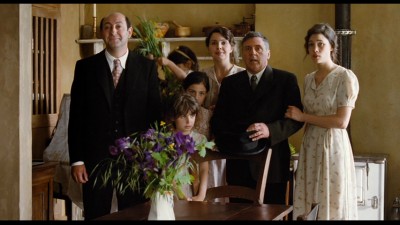
Daniel Auteuil's The Well-Digger's Daughter is an experience akin to that of seeing a very familiar friend in a new outfit that flatters, despite being very much in their expected style. It doesn't have any further ambition than to be a well-made period piece placed with intent into a very established tradition of popular literature (in this case, that of Marcel Pagnol, France's widely-read, beloved-admired answer to Dickens or Jane Austen), but within those narrow confines, director/star Daniel Auteuil (himself a perhaps too-familiar French institution bested only by Depardieu) lets himself stretch, relax, and enjoy the uniquely beautiful Mediterranean sunlight of the Provençal region to tell Pagnol's charming WWII-era tale of social conventions broken, familial and amorous love jeopardized, and family/community strengthened through adversity, all among essentially good-hearted people who just need to learn to be a bit less proud and staid and a bit more generous and flexible. It's essentially as innocuous and good-old-fashioned (though with markedly higher production values) as an episode of Little House on the Prairie, but we all crave that sometimes, don't we? Auteuil, who proves himself a good craftsman in his directorial debut, makes the film worth a cozy, untroubled look, a good candidate for a family film night; he deserves credit for not reverting to the rote where he so easily could have given the particular popularity and cachet of his material, and his gentle but attentive touch lets the film go above and beyond in lots of little ways that add up to something that's significantly more involving and touching than one might expect. Recommended.
|
| Popular Reviews |
| Sponsored Links |
|
|
| Sponsored Links |
|
|
| Release List | Reviews | Shop | Newsletter | Forum | DVD Giveaways | Blu-Ray | Advertise |
|
Copyright 2024 DVDTalk.com All Rights Reserved. Legal Info, Privacy Policy, Terms of Use,
Manage Preferences,
Your Privacy Choices | |||||||














